#Benefits of cloud computing
Explore tagged Tumblr posts
Text
The 7 Benefits of Cloud Computing and Its Advantages
🌐 Discover the 7 Benefits and Advantages that will revolutionize your digital experience.
Check out this insightful article by Intense Technologies: https://medium.com/@in10smarketing/the-7-benefits-of-cloud-computing-and-its-advantages-e4f55807b9dd
#Cloud computing#Benefits of cloud computing#Cloud advantages#Cost savings#Scalability#Flexibility#Accessibility#Performance and speed#Automatic updates#Maintenance#Security#Collaboration#Resource sharing#Cloud technology#Digital era empowerment.
0 notes
Text
key Feachure of A Cloud Computing Service Provider

https://it4int.com/dedicated-server-usa/
#7 characteristics of cloud computing#Key features of a cloud computing service provider#benefits of cloud computing#fractures of cloud programming#Five key features of a cloud computing service provider
0 notes
Text
Empowering Businesses: Exploring the Benefits of Cloud Computing in the 21st Century

Cloud computing is no longer a buzzword, but a critical business tool in the 21st century. With its immense potential, it is revolutionizing the way businesses operate
In the context of business, this change is driven by innovation and technology. And among the most significant of these technologies is cloud computing. It's changing the way businesses operate and compete.
Are you a business owner looking to revolutionize your operations?
Are you an executive seeking to enhance productivity and drive growth?
Or perhaps you're just a curious reader, eager to learn about the latest tech trends?
Whichever category you fall into, this article will provide a comprehensive exploration of cloud computing's benefits, packed with the latest data, facts, and real-world examples of successful cloud adoption.
Empowering Businesses: Exploring the Benefits of Cloud Computing in the 21st Century
Cloud Computing 101: What it is and How it Works
Imagine your business had an invisible superpower that could store, manage, and process data from anywhere, without being shackled to physical infrastructure. Sounds intriguing, right? Well, that's exactly what cloud computing offers.
So, what is cloud computing? Simply put, it's the delivery of computing services such as servers, storage, databases, networking, software, and analytics over the internet (the "cloud"). The beauty is, you only pay for what you use, much like utilities in your home.
But how does it work? Let's break it down.
Under the Hood: The Working Mechanism of Cloud Computing
It's simpler than you might think. When you store a file on your PC, it's saved on your hard drive. With cloud computing, instead of saving on your local hard drive, you're saving data on a remote database. This 'cloud' is actually a network of servers, where each has a different function.
Some servers use computing power to run applications. Others are responsible for storing data. When you upload a photo to the cloud, for example, it's moved from your device to a server in a massive data center. And voilà! You can access it anytime, anywhere, from any device with an internet connection.
What is Cloud computing?
Cloud computing is a technology that enables the delivery of on-demand computing resources over the internet. It involves the use of remote servers hosted on the internet to store, manage, and process data, instead of relying on local servers or personal computers.
In simple terms, cloud computing allows users to access and utilize computing resources, such as servers, storage, databases, software applications, and networking, without the need for physical infrastructure or hardware investments.
Cloud computing operates on a shared pool of resources, which can be accessed by multiple users or organizations simultaneously.
These resources are typically provided by cloud service providers, who manage and maintain the infrastructure and make it available to users on a subscription or pay-as-you-go basis.
Primary models of cloud computing
The three primary models of cloud computing are:
Infrastructure as a Service (IaaS): Provides virtualized computing resources, such as virtual machines, storage, and networks, allowing users to build and manage their own IT infrastructure on the cloud.
Platform as a Service (PaaS): Offers a complete platform for developing, testing, and deploying applications. PaaS providers provide the underlying infrastructure, including operating systems, runtime environments, and development tools.
Software as a Service (SaaS): Delivers software applications over the internet on a subscription basis. Users can access and use these applications directly through a web browser without the need for installation or maintenance.
Cloud computing offers several advantages, including scalability, flexibility, cost savings, and improved data security. It allows businesses to focus on their core activities while leaving the management of IT infrastructure to cloud service providers.
Read This Full ARTICLE, Click Here
1 note
·
View note
Audio
What is the Future of Cloud Computing?
Cloud computing has become the prime need and requirement of all industries. Every industry at the present time is realizing the need for an effective system that can cope with regular changes.
0 notes
Photo
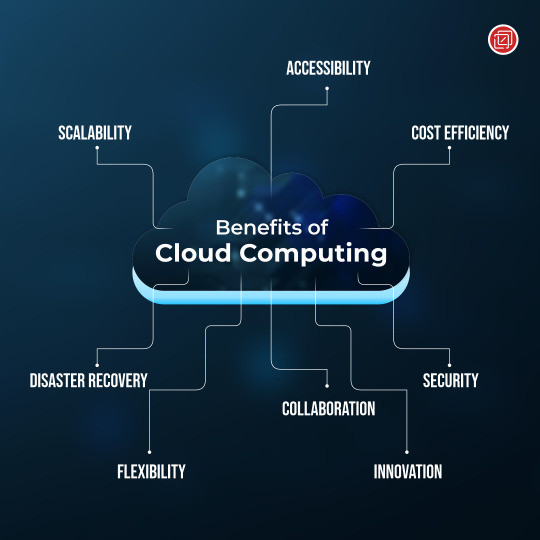
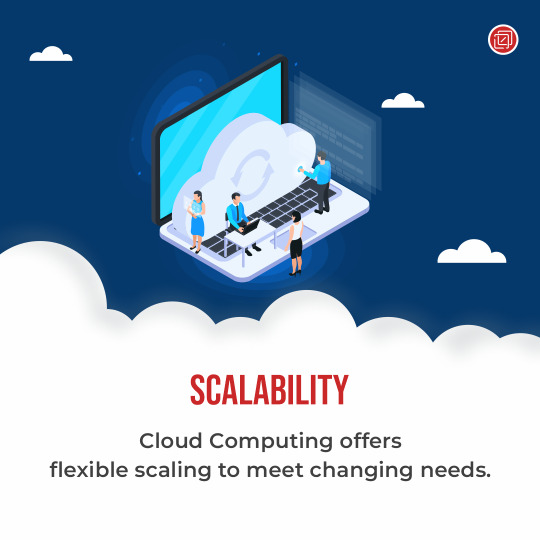
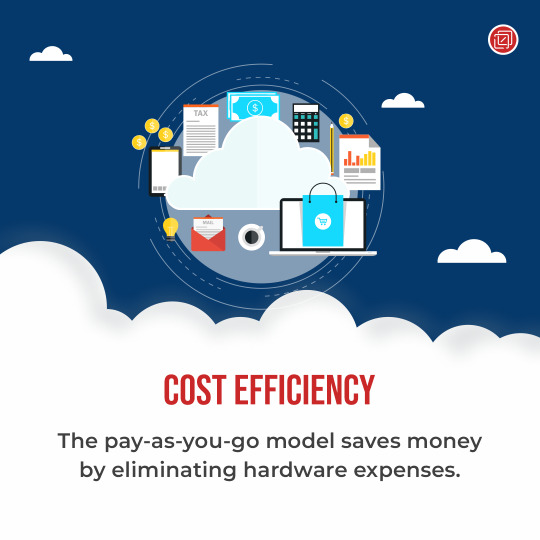
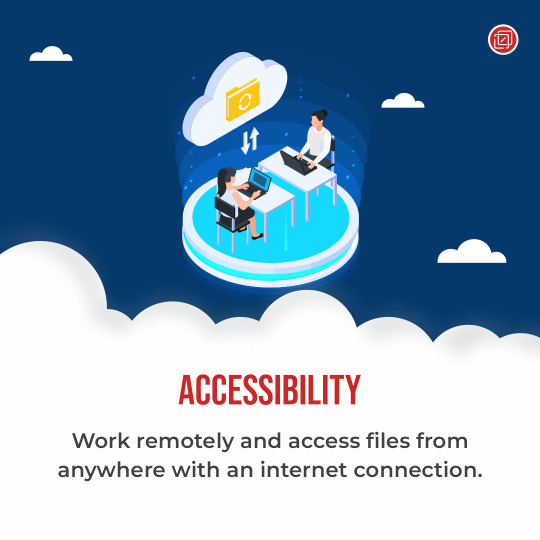
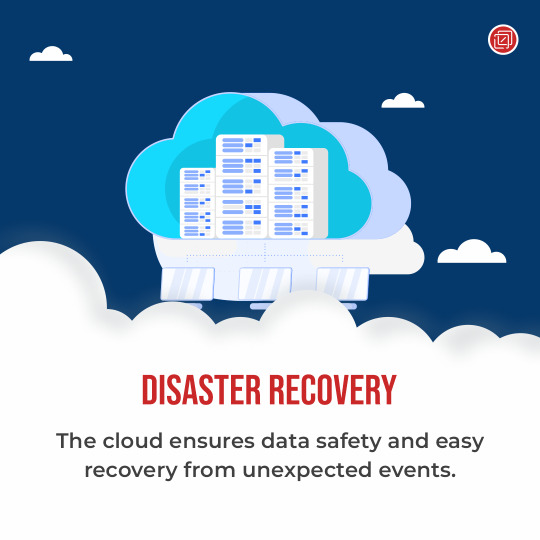
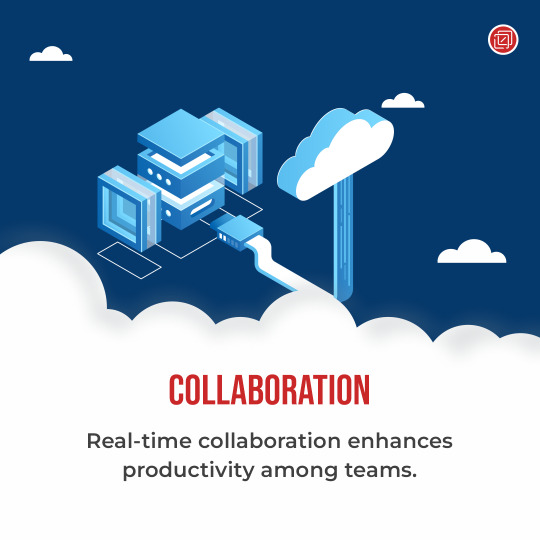
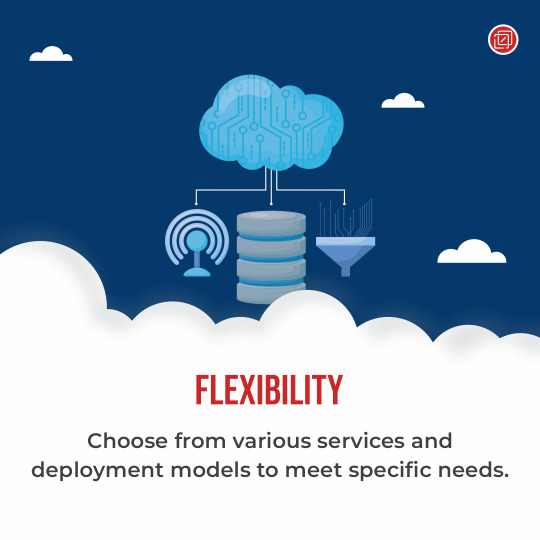
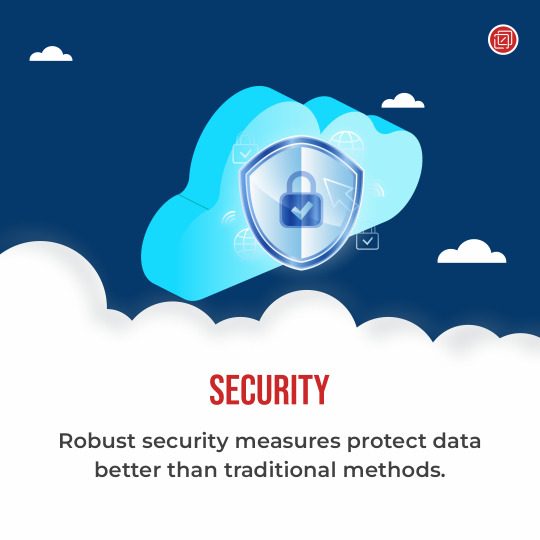
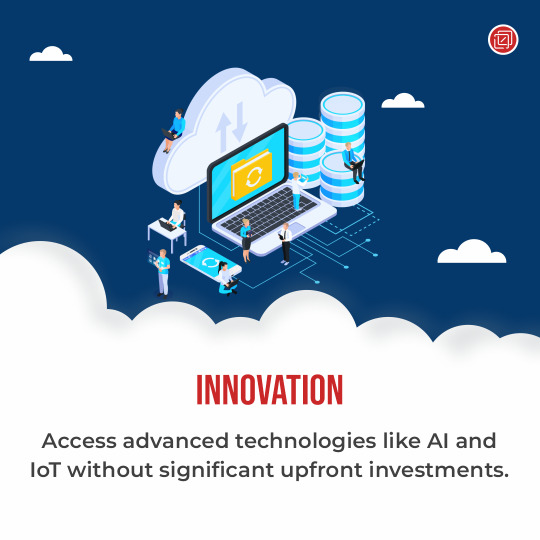
Embrace the cloud for scalability, cost efficiency, accessibility, disaster recovery, security, collaboration, flexibility, and innovation.
Remember to evaluate providers and implement security measures for successful cloud adoption.
Ready to unlock the power of the cloud? Consult with cloud experts and start harnessing these benefits for your business today!
Happy cloud computing! ☁️💪
6 notes
·
View notes
Text
Revolutionizing Infrastructure Management with Cloud Computing and AI

How organizations manage their IT resources, has changed with cloud computing infrastructure. By using it with the capabilities of artificial intelligence (AI), businesses can automate tasks, improve decision-making, and optimize operations. This blog will discuss how cloud computing is changing the face of infrastructure asset management.
Cloud Computing Infrastructure is the aggregate of virtual resources companies store, process, and manage data. It encompasses servers, storage, and networking and can be accessed over the internet instead of having physical hardware. Thus, the approach provides business enterprises with computing resources without maintaining expensive physical servers.
How Does Cloud Infrastructure Management Benefit Business Organizations?
The management process of cloud infrastructure includes overseeing those virtual resources to ensure they run efficiently. Managing cloud infrastructure includes observing performance, scaling up resources based on demand, and security. Since cloud-based systems can remove the hassle of having to manually manage physical servers, they allow businesses to focus solely on their core operations.
With cloud infrastructure solutions companies can scale their operations easily. Whether a company needs more storage space or computing power, cloud services make it simple to adjust based on usage.
The Role of AI in Cloud Computing
The integration of artificial intelligence in cloud computing has greatly improved the way cloud systems work. AI-powered cloud solutions help businesses optimize performance by automating routine tasks, predicting potential issues, and improving resource allocation.
AI uses machine learning to analyze vast amounts of data and provide real-time insights. It can forecast demand, prevent potential downtime, and ensure resources are used most efficiently.
Benefits of AI in Cloud Computing
Some of the key benefits of AI-powered cloud solutions are as follows:
1. Cost Savings: AI optimizes the use of cloud resources, thereby allowing businesses to pay for only what they need.
2. Improved Efficiency: The use of AI in business means faster processes and reduced human error.
3. Better Decision Making: AI offers data-driven insights that help businesses make better decisions.
4. Proactive Problem Solving: AI can predict issues before they become problems, thus minimizing downtime.
How Sharon AI Improves Cloud Computing
We are one of the excellent ways AI can improve cloud computing. We were created to optimize large-scale energy infrastructure and asset management. With expert knowledge in USA energy markets and infrastructure, Sharon AI improves energy system management by applying AI as well as cloud computing.
With the integration of Sharon AI with cloud infrastructure, energy companies can better understand their assets, predict failures, and automate maintenance tasks. This leads to better resource management, reduced downtime, and more sustainable energy use.
Step-by-Step Guide to Integrating AI and Cloud Solutions
Here's a simple guide to implementing cloud infrastructure solutions and AI in your business:
1. Assess Your Current Infrastructure: Take stock of your existing IT systems to determine which parts can be moved to the cloud.
2. Select a Cloud Service Provider: Choose a provider that offers the features and scalability your business needs.
3. Integrate AI: Implement AI-powered cloud solutions to optimize resource allocation and automate processes.
4. Monitor Performance: Regularly monitor cloud performance to ensure it meets your business’s needs.
5. Analyze Data: Use AI to draw insights from cloud data, and thus make informed decisions.
6. Plan for the Future: As your business grows, ensure that your cloud solutions and AI scale with it.
In a nutshell, cloud computing infrastructure and AI are changing the way business enterprises manage their resources. With the integration of these technologies, companies can increase efficiency, reduce costs, and optimize operations. Sharon AI is an excellent example of how AI can improve infrastructure asset management, particularly in energy sectors. With AI-powered cloud solutions, any business can remain ahead in this fast-changing technological world.
With the right tools and strategies, businesses can effectively manage their infrastructure and make smarter, data-driven decisions. Be it energy, finance, or any other industry, the key to long-term success lies in the combination of cloud infrastructure management with AI.
#cloud computing infrastructure#infrastructure asset management#Cloud Computing Infrastructure#Cloud Infrastructure Solutions#Cloud Infrastructure Management#Artificial Intelligence in Cloud Computing#AI-Powered Cloud Solutions#AI Cloud Computing Benefits#sharonai
0 notes
Text
Learn the fundamentals of cloud migration, including its importance for modern businesses. This guide explains how migrating applications and data to the cloud can enhance scalability, reduce IT costs, and offer greater flexibility while outlining key migration strategies and challenges.
#cloud migration#cloud computing#data migration#business cloud solutions#cloud migration benefits#IT strategy#cloud infrastructure.
0 notes
Text

Sierra Consulting Inc has joined forces with Monday.com to provide businesses with tailored CRM services that enhance customer relationship management. This partnership utilizes Monday.com's comprehensive CRM platform to develop solutions that improve efficiency and productivity in areas such as managing customer interactions, optimizing sales processes, and enhancing team collaboration.
#it#it jobs#tech#technology#sierra consulting#crm benefits#crm services#crm#sierra consulting inc#customer retention#customer relationship management#workplace#work day#improvement#best crm for small business#best crm software#best crm#crm software#crm development#crm solution#crm strategy#crm platform#crm integration#efficiency#cloud computing
0 notes
Text
Dominating the Market with Cloud Power

Explore how leveraging cloud technology can help businesses dominate the market. Learn how cloud power boosts scalability, reduces costs, enhances innovation, and provides a competitive edge in today's digital landscape. Visit now to read more: Dominating the Market with Cloud Power
#ai-driven cloud platforms#azure cloud platform#business agility with cloud#business innovation with cloud#capital one cloud transformation#cloud adoption in media and entertainment#cloud computing and iot#cloud computing for business growth#cloud computing for financial institutions#cloud computing for start-ups#cloud computing for travel industry#cloud computing in healthcare#cloud computing landscape#Cloud Computing solutions#cloud for operational excellence#cloud infrastructure as a service (iaas)#cloud migration benefits#cloud scalability for enterprises#cloud security and disaster recovery#cloud solutions for competitive advantage#cloud solutions for modern businesses#Cloud storage solutions#cloud technology trends#cloud transformation#cloud-based content management#cloud-based machine learning#cost-efficient cloud services#customer experience enhancement with cloud#data analytics with cloud#digital transformation with cloud
1 note
·
View note
Text
Why Cloud Technology is Essential for Scalable Mobile Apps

1. Introduction
As mobile applications continue to evolve and grow in popularity, ensuring their scalability becomes more critical than ever. The capacity to handle increasing loads and provide a seamless user experience is no longer just a technical challenge; it’s a business imperative. Cloud technology has emerged as a key solution to these challenges, offering the flexibility and resources necessary for scalable mobile app development. In this article, we’ll explore why cloud technology is essential for scalable mobile app development, with a focus on custom mobile app development in Saudi Arabia.
2. Understanding Cloud Technology
Cloud technology involves utilizing remote servers accessed online to store, manage, and process data, instead of depending on local servers or personal devices. It has revolutionized the way mobile applications are developed, offering a range of services that cater to the needs of developers and businesses alike.
2.1 Types of Cloud Services
Three primary cloud service models exist:
Infrastructure as a Service (IaaS): Offers virtual computing resources delivered over the internet. Developers can rent virtual machines, storage, and networks, allowing them to scale resources up or down as needed.
Platform as a Service (PaaS): Offers a platform for developers to build, deploy, and manage applications, easing the scaling process without the need to manage the underlying infrastructure.
Software as a Service (SaaS): Delivers software applications online on a subscription model. Users can access these applications via the web without managing the infrastructure or platform.
2.2 Benefits of Cloud Technology
Cloud technology offers numerous benefits that make it indispensable for modern mobile app development:
Scalability: Cloud services can quickly scale to accommodate increasing traffic or data loads, ensuring that apps remain responsive and efficient.
Flexibility: Developers can deploy and manage apps across multiple regions and platforms, providing users with consistent experiences regardless of location.
Cost-Efficiency: With pay-as-you-go pricing models, businesses can optimize costs by paying only for the resources they use, avoiding the need for significant upfront investments.
3. Importance of Scalability
Scalability is the ability of a mobile app to handle a growing number of users and transactions without compromising performance. In markets like Saudi Arabia, where mobile app usage is on the rise, scalability is crucial for maintaining user satisfaction and ensuring long-term success.
3.1 Challenges in Traditional Scaling
Traditional scaling methods, such as adding more physical servers or upgrading existing hardware, can be both expensive and time-consuming. They also often fail to provide the flexibility needed to adapt to sudden changes in demand, leading to performance issues and potential downtime.
4. Cloud Technology for Mobile App Scalability
Cloud technology addresses the limitations of traditional scaling by offering advanced tools and services that make it easier to scale mobile apps efficiently.
4.1 Elasticity and Auto-Scaling
Elasticity is a key feature of cloud computing, allowing resources to be automatically scaled up or down based on current demand. Auto-scaling ensures that mobile apps can handle traffic spikes without compromising performance, providing a seamless user experience.
4.2 Load Balancing and Traffic Management
Cloud-based load balancing distributes incoming traffic across multiple servers, preventing any single server from becoming overwhelmed. This not only improves app performance but also enhances its reliability and availability.
4.3 Data Management and Storage
Cloud services offer scalable data storage solutions that can accommodate vast amounts of data generated by mobile apps. These solutions are designed to be both secure and accessible, ensuring that app data is managed efficiently.
5. Custom Mobile App Development in Saudi Arabia
Saudi Arabia is experiencing rapid growth in mobile app usage, driven by a tech-savvy population and a strong economy. Custom mobile app development is essential for businesses looking to meet the specific needs of Saudi users and gain a competitive edge in the market.
5.1 Market Trends and Demands
The Saudi Arabian market is characterized by a high demand for innovative, user-friendly apps that cater to both consumers and businesses. As the government pushes for digital transformation under its Vision 2030 initiative, the demand for custom mobile apps is expected to increase significantly.
5.2 Considerations for Local Developers
Developers targeting the Saudi market must consider local preferences, cultural nuances, and regulatory requirements. Additionally, they must ensure that their apps are scalable to handle the growing number of users in the region.
6. Case Studies and Success Stories
To understand the impact of cloud technology on scalable mobile app development, we can look at successful case studies from around the world and within Saudi Arabia.
6.1 Global Case Study
An example of a global mobile app that successfully leveraged cloud technology for scalability is Netflix. By utilizing cloud services, Netflix can stream content to millions of users simultaneously, without interruptions or performance issues.
6.2 Saudi Arabian Case Study
In Saudi Arabia, the ride-hailing app Careem has become a success story by utilizing cloud technology to scale its operations. Careem’s cloud-based infrastructure allows it to handle millions of rides across the region, ensuring a smooth experience for both drivers and passengers.
7. Future Trends in Cloud and Mobile App Development
The future of mobile app development will be shaped by emerging trends in cloud technology, with a focus on enhancing scalability and user experience.
7.1 AI and Machine Learning in Cloud
Artificial Intelligence (AI) and Machine Learning (ML) are becoming increasingly integrated into cloud services, offering predictive analytics, personalized experiences, and improved decision-making capabilities. These technologies will play a critical role in enhancing the scalability of mobile apps.
7.2 The Rise of Edge Computing
Edge computing, which involves processing data closer to the source of data generation, is expected to revolutionize mobile app development. By reducing latency and improving real-time data processing, edge computing will enhance the scalability and performance of mobile apps.
8. Best Practices for Cloud Implementation
Successfully implementing cloud technology demands thorough planning and adherence to best practices, especially regarding scalability.
8.1 Security and Compliance
Ensuring data security and compliance with local regulations is paramount when using cloud services. Developers should implement robust security measures, such as encryption and multi-factor authentication, to protect app data.
8.2 Cost Management Strategies
Managing costs is a key concern for businesses using cloud services. By optimizing resource usage, leveraging cost management tools, and choosing the right pricing models, businesses can keep costs under control while scaling their apps.
9. Conclusion
Cloud technology has become essential for scalable mobile app development, offering the flexibility, efficiency, and resources needed to meet the demands of a growing user base. For businesses in Saudi Arabia, leveraging cloud services is key to staying competitive in a rapidly evolving market. By understanding the benefits and best practices associated with cloud technology, developers can create mobile apps that not only meet current demands but are also poised for future growth.
10. FAQs
Q1: What is cloud technology in mobile app development?Cloud technology involves utilizing remote servers accessed through the internet to store, manage, and process data. This enables mobile apps to scale efficiently and manage growing user demands.
Q2: Why is scalability important for mobile apps?Scalability ensures that a mobile app can handle an increasing number of users and transactions without compromising performance, which is crucial for maintaining a positive user experience.
Q3: How does cloud technology enhance app scalability?Cloud technology provides features like elasticity, auto-scaling, and load balancing, which allow mobile apps to scale dynamically in response to changing demand.
Q4: What are some challenges of traditional scaling methods? Traditional scaling methods, such as adding more physical servers, can be costly, time-consuming, and inflexible, making them less effective for modern mobile apps. Q5: What are the key considerations for developing custom mobile apps in Saudi Arabia? Developers should consider local market trends, user preferences, cultural nuances, and regulatory requirements, as well as ensuring their apps are scalable to handle growing demand.
#Cloud-based app development#Scalable mobile apps#Cloud computing in app development#Mobile app scalability#Cloud infrastructure for apps#App development in the cloud#Scalable application architecture#Cloud technology for developers#Mobile app performance with cloud#Cloud-native mobile apps#App development scalability solutions#Cloud services for app developers#Benefits of cloud for mobile apps#Cloud-enabled app growth#Cloud computing for scalable apps
1 note
·
View note
Text
#Cloud Computing Benefits#Cloud Computing#cloudcomputing#technology news#global health news#tech gadgets#technology industry#technology integration#cloud managed services#cloud services#health information tech
0 notes
Text
AI-Powered Software Solutions: Revolutionizing the Tech World
Introduction
Artificial intelligence has found relevance in nearly all sectors, including technology. AI-based software solutions are revolutionizing innovation, efficiency, and growth like never before in multiple industries. In this paper, we will walk through how AI will change the face of technology, its applications, benefits, challenges, and future trends. Read to continue..
#trends#technology#business tech#nvidia drive#science#tech trends#adobe cloud#tech news#science updates#analysis#Software Solutions#TagsAI and employment#AI applications in healthcare#AI for SMEs#AI implementation challenges#AI in cloud computing#AI in cybersecurity#AI in education#AI in everyday life#AI in finance#AI in manufacturing#AI in retail#AI in technology#AI-powered software solutions#artificial intelligence software#benefits of AI software#developing AI solutions#ethics in AI#future trends in AI#revolutionizing tech world
0 notes
Text
Cloud Architecture offers many advantages like scalability, flexibility, and cost efficiency in your business. Cloud Architecture is designed to build cloud based applications & services. Cloud Architectures used by small business & large business. Organizations can increase their revenue by including cloud architectures in their business. Cloud Computing provides a secure platform to build applications & cloud service. To get more about cloud computing architecture explore our informative article.
#cloud computing architecture#what is cloud computing#cloud computing benefits#advantage of cloud computing
0 notes
Text
Cloud benefits across business operations with C-suite collaboration
Are you a C-suite executive navigating the complexities of modern business landscapes? 🌐 It's time to harness the transformative potential of cloud technology! ☁️
Cloud computing offers a symphony of advantages, but to capitalize, C-suite leaders need to ensure each department plays its part. Cloud benefits for C-suite are different departmentally.
We delve into the myriad benefits that cloud computing offers to businesses like yours. From increased flexibility and scalability to enhanced collaboration and innovation, the cloud is revolutionizing the way organizations operate.
🚀 Accelerate Innovation: Discover how the cloud empowers your teams to innovate faster, bringing new products and services to market ahead of the competition.
💼 Boost Productivity: Streamline workflows and empower your workforce to collaborate seamlessly from anywhere in the world, driving productivity to new heights.
🔒 Fortify Security: Safeguard your valuable data with advanced security measures offered by leading cloud providers, ensuring peace of mind in an increasingly digital world.
💰 Drive Cost Savings: Say goodbye to costly hardware investments and maintenance expenses. With the cloud, you pay only for what you use, optimizing your IT budget for maximum efficiency.
🌍 Scale Globally: Expand your business horizons effortlessly with the scalability of cloud infrastructure, enabling you to reach new markets and customers with ease.
Given the difference in benefits across business functions, C-suite leaders can help increase their benefit analysis across silos to maximize cloud benefits. While individual departments excel in leveraging specific cloud benefits, maximizing the overall impact requires a strategic shift. C-suite leaders can act as catalysts, fostering collaboration to break down departmental silos.
0 notes
Text
Understanding Virtual Machines: A Comprehensive Overview
What is a Virtual Machine? In the realm of computing, a virtual machine (VM) is a software emulation of a physical computer. It operates in an isolated environment, abstracted from the underlying hardware, allowing multiple operating systems (OS) to run simultaneously on a single physical machine. This virtualization technology has revolutionized the way computing resources are utilized,…

View On WordPress
#Benefits of Virtual Machines#Challenges and Considerations#cloud computing#Server virtualization#Virtualization technology
0 notes
Text
Discover the strategic advantages of transitioning to Software-as-a-Service (SaaS) for your business in 2024. Learn how SaaS enhances scalability, reduces IT costs, improves collaboration, and ensures robust security. With rapid deployment and continuous updates, SaaS empowers businesses to innovate and respond swiftly to market changes, making it a vital investment for future growth.
#SaaS benefits#cloud computing#software as a service#IT cost reduction#business collaboration#security compliance#scalable solutions#innovative technology.
0 notes